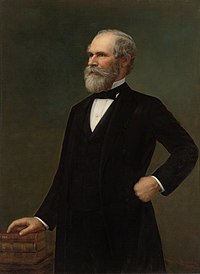Galusha Aaron Grow
| Galusha A. Grow | |
|---|---|

Oil portrait from 1891 by William A. Greaves.
|
|
| 24th Speaker of the United States House of Representatives | |
|
In office July 4, 1861 – March 4, 1863 |
|
| President | Abraham Lincoln |
| Preceded by | William Pennington |
| Succeeded by | Schuyler Colfax |
| Member of U.S. House of Representatives from Pennsylvania's At-large, 12th & 14th districts |
|
|
In office March 4, 1851 – March 3, 1853 (12th) March 4, 1853 – March 3, 1863 (14th) February 26, 1894 – March 3, 1903 (AL) |
|
| Preceded by |
David Wilmot Thomas M. Bibighaus William Lilly (AL) Alexander McDowell (AL) |
| Succeeded by |
Hendrick B. Wright William H. Miller 29th: George Shiras III 30th: John Dalzell |
| Personal details | |
| Born |
Aaron Galusha Grow August 31, 1823 Ashford, Connecticut |
| Died | March 31, 1907 (aged 83) near Scranton, Pennsylvania |
| Political party |
Democratic Republican |
| Alma mater | Amherst College |
| Profession | Law |
| Signature | |
Galusha Aaron Grow (August 31, 1823 – March 31, 1907) was a prominent American politician, lawyer, writer and businessman, and was a Pennsylvania representative and Speaker of the U.S. House of Representatives from 1861 to 1863. He was defeated for reelection in 1862. He remained the last sitting House Speaker to be defeated until Tom Foley of Washington lost his seat in 1994.
Grow was born Aaron Galusha Grow in Ashford, Connecticut. His given names were the suggestions of an aunt living in Vermont, who was visiting Grow's mother when he was christened: "Aaron" was the aunt's husband's name (his full name was Aaron Nichols (1764-1807)), and "Galusha" was the surname of a governor of Vermont she admired. His family called him Galusha when he was growing up, and before Grow was a teenager, he had started writing his name with his given names reversed. He was educated at Franklin Academy in Susquehanna County, Pennsylvania, and later at Amherst College. He studied law and was admitted to the bar in November 1847 and then began his law practice.
Grow ran as a Democrat in the 1850 elections and served as a member of that party during the 32nd and 33rd Congresses and part of the 34th Congress. He switched parties in the wake of President Pierce's signing of the Kansas-Nebraska Act.
He ran as a Republican for the 1856 elections and remained a member of that party for the rest of his political career.
...
Wikipedia
